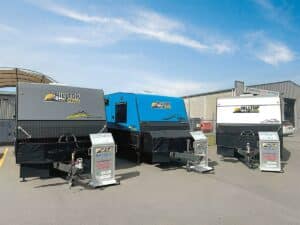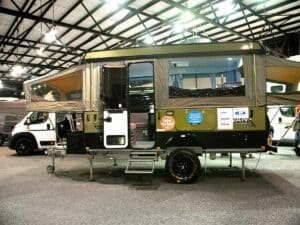Most RV owners purchase their motorhome or caravan with expectations of being out on the road at every given chance. However, sometimes those opportunities come a little less frequently than they’d like. Work or other commitments can mean the RV is left sitting on the driveway for weeks at a time.
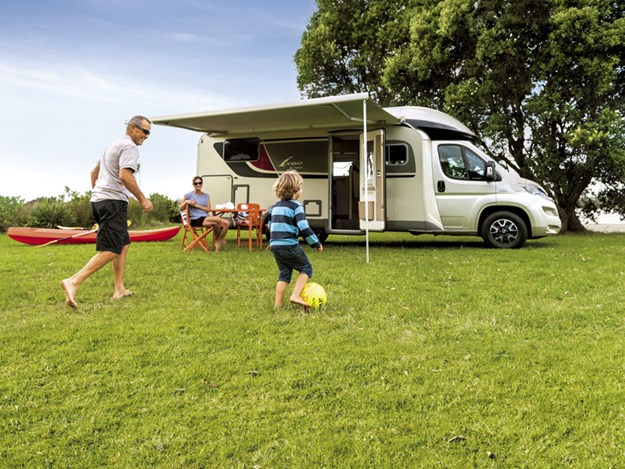 |
Peer-to-peer lending is a great way for families to share their RV, and make some extra income |
Increasing numbers of RV owners are using this opportunity to take advantage of the benefits of peer-to-peer (P2P) lending, which provides a chance make extra cash, meet new people, and share the motorhoming lifestyle. Peer-to-peer motorhome lending works similarly to Airbnb accommodation.
RV owners list their vehicle - be it motorhome, caravan or campervan - on a provider website, allowing potential renters to view and book their vehicle for holidays. Currently, there are just a handful of providers in New Zealand. Mighway and ShareaCamper both launched here in 2015, with newcomer Camplify kicking off this year.
Why rent through a P2P?
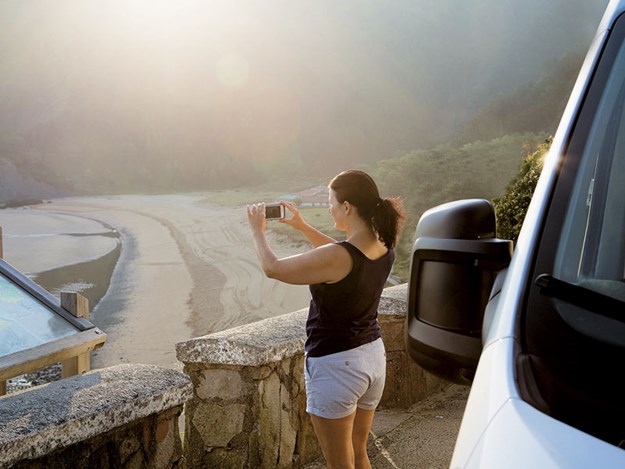 |
Peer-to-peer motorhome lending works similarly to Airbnb accommodation |
One of the benefits for those looking to rent through a peer-to-peer lender is the variety of vehicles available, making it more likely they will find an RV that’s the best match for them. From cool VW Kombis and cute retro caravans to luxury European motorhomes with all the bells and whistles, the chances are it will be on a P2P site.
Another bonus for renters, especially for international visitors, is that they can enjoy a true ‘Kiwi’ experience, meeting and chatting with owners based in all areas of New Zealand who can share their tips on what to see and do, what the local ‘hidden gems’ are, and share stories about their travels.
Shelley Porter and her husband Steve have their motorhome listed with Camplify. “We meet the families sharing our motorhome when we drop it off. We always explain to them how much we love spending time in our motorhome and we want to give others the opportunity to have a go,” says Shelley.
And it’s not just holidaymakers who are hiring through P2P services. Potential buyers find it a useful way of testing out their dream RV. “Recent Australian research found that almost 75 per cent of buyers are keen to test motorhomes and campers via the sharing economy before they invest,” says Camplify founder and CEO Justin Hales.
It’s a model that’s gaining popularity. Camplify has already signed up 100 New Zealand owners since its launch three months ago. Mighway and ShareaCamper have also seen an increase in membership. “Our listings are growing as owners understand the P2P process and that they can offset the cost of their motorhome,” says Mighway’s marketing and communications executive, Nicole Gilmour.
How does it work?
Once you’ve chosen the provider you’d like to list with, you’ll work with them to have your vehicle listed. You’ll need to arrange some good photos of your RV, write up some copy that tells potential renters all about it, and decide on pricing. Providers can help you with this, including suggesting how to set the best price.
Renters also need to sign up with a provider (free of charge) before they can book a rental, and are screened and licence-checked (this process varies between providers). They can then choose the location they want to rent from, peruse available RVs, and book online.
RV owners are able to choose how much involvement they wish to have with renters. For example, Mighway allows you to choose from its Local or Managed Services. With its Local Service, you manage the vehicle handover, cleaning, and checks yourself, or you can pay extra through the Managed Service and essentially hand over your vehicle to Mighway and have it take care of everything.
How much money can I make?
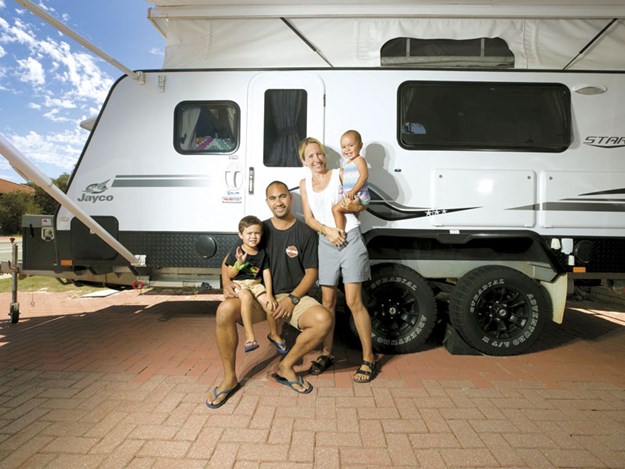 |
Elle, Tiki and family with one of their rental campers |
Your income will be based on the daily rate you choose, and how often your RV is rented out. For some RV owners, that may mean a few hundred dollars here and there when they’re not enjoying their own travels.
For others, it could potentially be thousands of dollars over a month, especially if you decide to purchase more than one vehicle to rent out. “In Australia, we’ve seen many owners negatively gear their caravan investment,” says Justin.
“Through our Premium membership, we have helped set up over 500 small businesses in Australia, and are beginning to do so in New Zealand.” Elle Tamihana and her partner Tiki have done just this, running their own business, Journey Unknown Campers, through Camplify.
The couple is currently based in Australia but is soon heading back to New Zealand, along with their three campers. “It originally started just as a hobby with our own forward-fold camper,” says Elle. “We had two small kids and a fully stocked camper in the backyard.
At the time, my hubby couldn’t get away from work as often as we would like. It was the perfect way to make a little extra money and let other families enjoy the camper while we couldn’t. Since then we’ve added another two campers, a Jayco Starcraft Bunk van and an off-road Patriot X1. Our little fleet is all off-grid, self-contained caravans and campers.”
Making the most of it
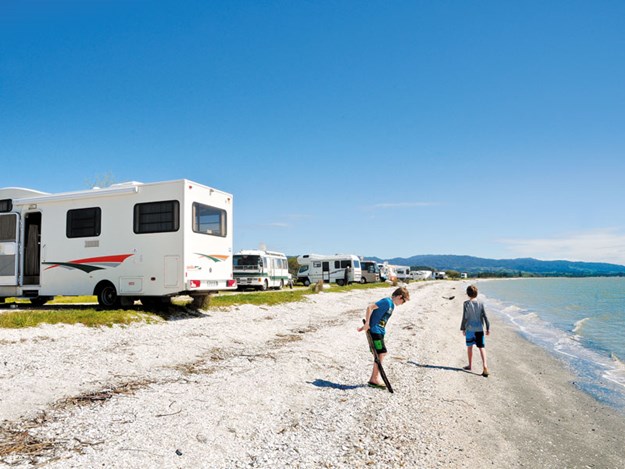 |
Self-contained vehicles are the most popular, as they give guests the flexibility to freedom-camp during their trip |
So which type of vehicle is likely to get the most listings? Four- or six-berth vehicles are the top choice for families. Nicole says that luxurious features are also well sought after, as are fixed/permanent beds and separate toilet/shower facilities.
“Self-contained vehicles are the most popular, as they give guests the flexibility to freedom-camp during their trip.”Keeping your vehicle in good shape and well-presented will help ensure it is rented more often. And of course, the more often it is available, the more income you can earn.
Taking high-quality photos that show off your motorhome’s tidy interior could make the difference between a family choosing your RV over someone else’s. Added extras can also help increase its popularity - a barbecue, television, child safety seat, pushchair, outdoor furniture, and bikes are all good options to encourage renters.
“Being engaged and responding quickly to guests, having an effective listing, good vehicle description, clear photos, and sensible pricing will all help owners maximise their rental income,” says Nicole. “Some owners go the extra mile for guests with things like welcome baskets, as well as airport pick-ups/drop-offs.”
But, most of all, make sure your RV is kept regularly serviced and reliably maintained. “Safety is always our number-one consideration,” says ShareaCamper’s sales manager, Kelly McLean. “So, the age and reliability of the vehicle are fundamental. In the rare case where a vehicle has not been roadworthy, we’ve removed the listing.”
Potential drawbacks
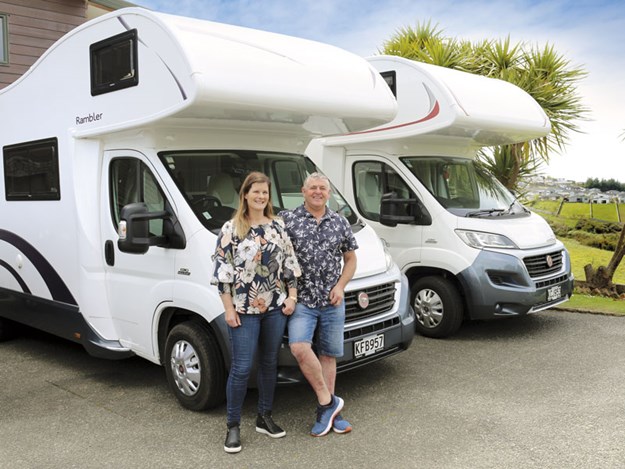 |
Jo and Trev and their motorhomes |
One of the first things most RV owners worry about when considering P2P sharing is the possibility of their motorhome being damaged. You’ll need to have your motorhome comprehensively insured.
However, P2P providers offer additional insurance options to cover your motorhome while it’s being rented. Insurance options vary between providers, so you’ll need to read the fine print to ensure you fully understand, and are happy with, what’s being offered.
“Owners need to understand that hiring out an RV is exactly that. You’re allowing families to enjoy the set-up and there needs to be understanding that kids will be kids, and that will mean some wear and tear,” says Elle. “When we rent out our motorhomes, we provide renters with good guidebooks on how to use our campers which can help prevent possible damage through misuse.
We haven’t had a lot of damage at all to be honest.”Owners also worry about whether they can trust the renter to take good care of their beloved motorhome. “One way we assist in allaying such fears is by making our platform very user-friendly for both owners and travellers,” says Kelly.
“Most bookings are made many months in advance, and often by the time the traveller collects the vehicle a nice bond and level of trust is created.”Owners should also be aware that, because their RV will be used as a rental vehicle, it will require a Certificate of Fitness (COF) even if it currently runs on a WOF. Find out more about WOFs and COFs on page 96.
Motorhome owners Jo Knox and her husband Trev also have a fleet of three motorhomes listed through Mighway. Their biggest worry was not getting enough bookings. “But we got our first booking within a week of listing and several more after that. It’s early days for us, but one motorhome is already booked for 14 out of 22 weeks between now and February, with the other booked for 11 weeks.”
Is P2P for me?
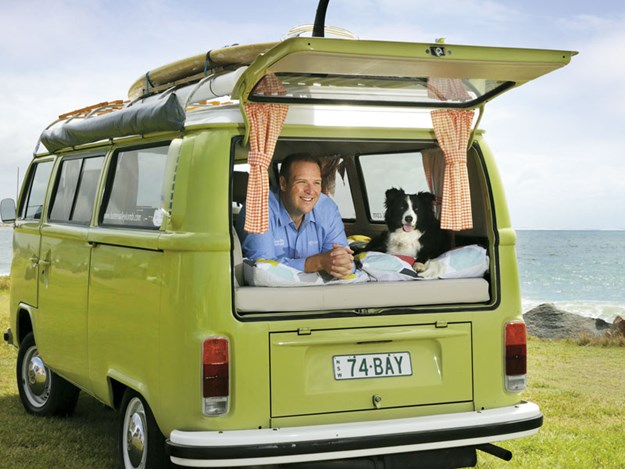
Before signing yourself up with your chosen P2P provider, it’s good to ask, “How would I feel if my motorhome’s interior gets scratched, or the bumper ends up needing panel beating?” If this is simply too worrisome, and for many RV owners it is, then a P2P scheme may not be right for you.
On the other hand, if your RV is taking up space in the driveway more often than you’re using it, and you love the idea of meeting travellers and sharing the vehicle, a P2P scheme certainly offers good benefits.
Pros
- Your unused motorhome is not taking up room on your driveway.
- The ability to earn extra cash.
- Meeting new people and sharing travel stories.
- You can block out dates when you want to use it.
Cons
- You need to be available for handovers (unless you use a more ‘managed’ service).
- Wear and tear on your vehicle and possible damage.
- You’ll need a COF (regardless of your vehicle’s weight).
- Your vehicle needs to be available for bookings, and peak times are the most popular, which could affect your ability to use it yourself.

